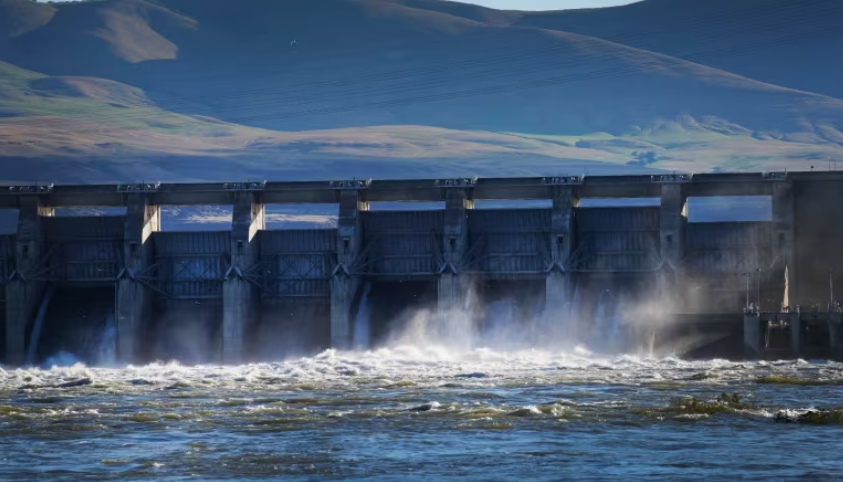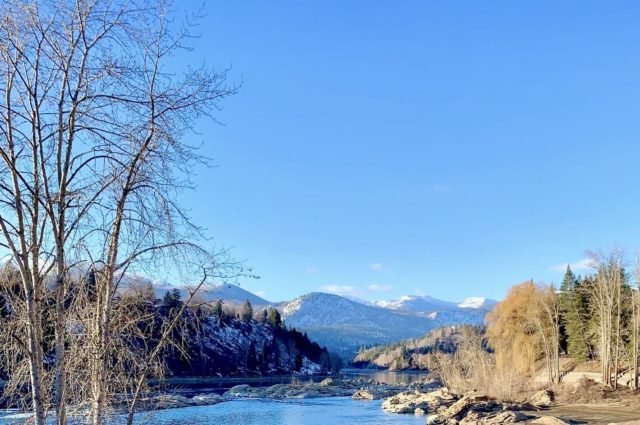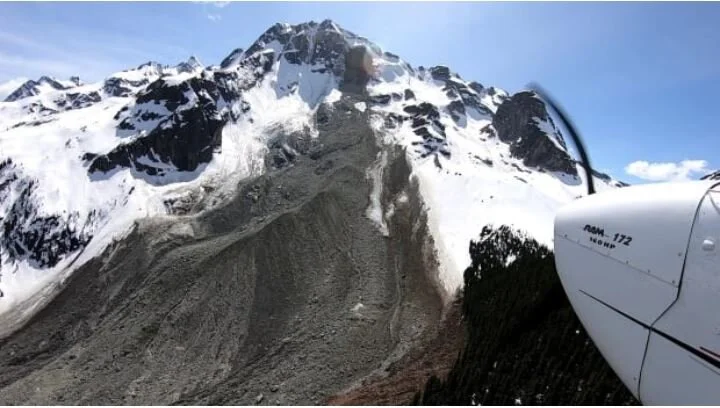Drought is part of the reason. But so too is the Columbia River Treaty with the United States that obligates B.C. to direct water from the reservoir across the border at American behest. The grim scenes described by Youmans illustrate the stakes in ongoing talks between Canadian and U.S. negotiators to modernize the 62-year-old treaty, as the increased risk of extreme weather weighs on both sides. Part of the treaty that gives the United States direct control over a portion of the water in Arrow Lakes Reservoir and two other B.C. dams is set to expire in September 2024.
Money, power and an ecosystem are all at stake in Canada-U.S. negotiations over a massive river
Walk along the banks of the Columbia River in B.C. and you might be forgiven for thinking it's like any of the province's other big waterways. You might spot a sturgeon, or glimpse one of the more than 60 dams in the Columbia's watershed. But the Columbia is not like other rivers. For one, it crosses the U.S. border to empty into the Pacific in Oregon. The Columbia River basin is also a vital source of electricity, providing about 40 per cent of all U.S. hydroelectric power, while B.C. draws almost half of its total electrical generation from the region.
Talks moving forward on key Canada-U.S. treaty on Columbia River management
Canadian and U.S. officials have wrapped up the latest round in a five-year negotiation to modernize a major treaty on flood control and power generation on the Columbia River. Global Affairs Canada says negotiators from both countries in the Columbia River Treaty met in Kelowna on May 16 and 17, and the next round of talks is scheduled for Aug. 10 and 11 in Seattle.
Help Lower Columbia-Kootenay stewardship streamline freshwater priorities
Have questions or want to learn more about water stewardship in the Lower Columbia-Kootenay hydrologic region? Then mark Feb. 15 on your calendar as a day to have your voice heard in a community meeting focused on the life of local watersheds. Living Lakes Canada is hosting four public engagements around water concerns and priorities in the hydrologic region which, in the immediate area, encompasses Rossland and Trail to Castlegar, Salmo and Nelson.
Kootenay River ‘interests’ to take centre stage in upcoming Columbia River Treaty talks
The plight and height of the Kootenay River will be the current of conversation when the Columbia River Treaty talks go virtual early next month. A virtual information session is slated for Feb. 2 — with another on Jan. 30 on the Columbia River — to provide details and answer questions about the process, with the focus on Kootenay River “interests.” Those interests — as well as information on the Columbia River Treaty Local Governments Committee’s initiative — will be revealed in the two webinars, along with the performance measures that have been identified to date.
Teck Metals Ltd. ordered to pay a $2.2 million fine for unlawful deposit of effluent into the Columbia River
Canadians value clean water and a sustainable environment. Environment and Climate Change Canada enforcement officers strive to ensure that businesses and individuals comply with laws and regulations that protect Canada's natural environment. On January 10, 2023, in the Provincial Court of British Columbia, Teck Metals Ltd. was ordered to pay a total of $2.2 million after earlier pleading guilty to two charges laid under the federal Fisheries Act and one charge laid under the provincial Environmental Management Act. The charges stem from a 2019 release of effluent into the Columbia River. The federal fine of $2 million will be directed to the Government of Canada's Environmental Damages Fund. In relation to the provincial charges, Teck Metal Ltd. was ordered to pay a total fine of $200,000.
What if Teenagers Renegotiate the Columbia River Treaty?
You may have heard about the Columbia River Treaty in the news once, or perhaps many times, over the last decade. The Columbia River Treaty is an agreement between Canada and the United States about our shared watershed. It was originally ratified in 1964 with negotiations to “modernize” it ongoing since May 2018. It’s big. It’s complicated. It’s important. It’s confusing.
Coordinated action critical to preventing flooding in Portland, Vancouver
Without careful coordination for flood risk management throughout the water year, the Columbia River would have hit a stage of 25 feet at Vancouver in June, a height not seen in the river in springtime since 1956. That level would be considered ‘major flood stage’, as determined by the National Weather Service. Evidence of the same storm’s power was seen further south in the damaging flooding along the Yellowstone River in northern Wyoming.
The Columbia River Treaty
A myriad of First Nations on either side of the border like the Secwépemc (Shuswap) and Ktunaxa (Akisqnuk) have had deep seeded roots to the Columbia River for thousands of years, long before the Treaty attached to it ever became a notion. What is the Columbia River Treaty? The Columbia River Treaty is a water management agreement that was implemented in 1964 between the United States and Canada and is well-respected internationally.
Earth's frozen 'water towers' threatened by warming, population growth, report says
Water frozen at the tops of mountains that helps sustain up to a quarter of the human population is under threat from climate change, population growth and lack of proper management, according to a new international study. The systems store and transport water through glaciers, snow packs, lakes and streams. They supply water to 1.9 billion people on Earth. A group of 32 international scientists — including one Canadian — published a paper in the journal Nature on Monday to highlight the importance and vulnerabilities of what they call Earth's 78 water towers.
A second chance: Canada, U.S. renegotiate a critical water treaty
The Columbia River Treaty, an international agreement governing the flow of water between British Columbia and six U.S. states, will be 55 years old this year. It has not aged well. The river springs from the Columbia Icefield in the Rocky Mountains of B.C. and winds 1,930 kilometres through the Northwestern United States – Washington, Oregon, Idaho, Montana, Nevada and Wyoming. No other river in North America spills more water into the Pacific Ocean.













